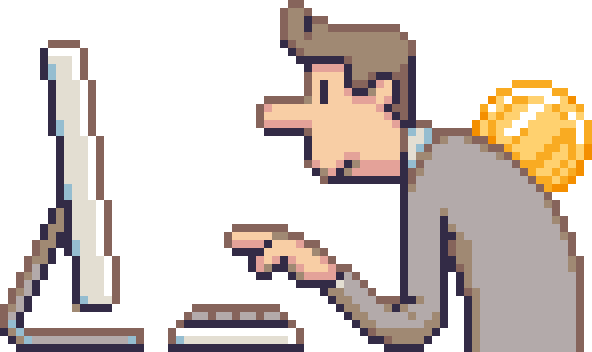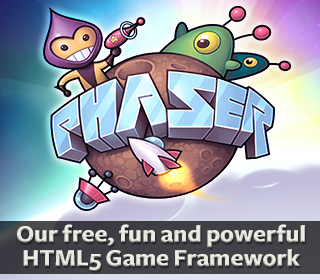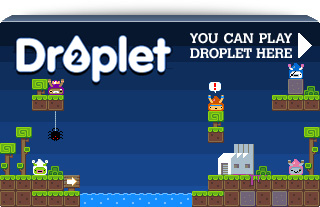Business Category
-
Insert Coin to Continue: The HTML5 Game Sponsorship Market
27th Sep 201245
I had the pleasure of giving a presentation at the onGameStart 2012 conference in Warsaw, Poland. The title of my talk was “Insert Coin to Continue”. A gentle nod to the fact that lots of game developers do actually need paying in order to carry on creating great games! I wanted to share my experiences and results of working in the HTML5 game sponsorship market. The Flash world is well served by sites like FGL and blog posts detailing income and strategies. But very little exists for HTML5 games, hence the choice of topic for my talk. This article will cover most of my presentation for those who weren’t able to attend.
Client games vs. Indie games
As a company we develop HTML5 games for both clients and ourselves. The reason is both financial and practical. Client work simply pays better right now. And the more of it you do, the more doors it can open to other bigger and more interesting projects. In my experience this is no different to any other platform. But there are obvious benefits of making your own games:
- It’s your own IP! There is value in establishing a brand and common IP even in the relatively small scale sponsorship world.
- You can make anything. This is important – no matter how awesome your clients are you are always working within set brand guidelines. They’ll never really allow you to do truly anything you want. But when you build for yourself this restriction is removed. You have to be careful of course, as great as Dinosaur Chicken Rock III might sound to you, if you want to get sponsors it needs to appeal to the wider market too.
- There is the very real chance of long term income. I’ll cover this later in the article, but ad revenue and ‘game rental’ can build up substantially over time, where as most client work is a one-off payment.
The benefits are obvious. As well as getting to flex your design muscles in your own way there are significant long term benefits as well. Lots of companies started out by mixing client and indie work only to find that the income from their indie endeavors was enough to leave the client side behind (Nitrome are a good example of this). So let’s explore how you turn this passion into income.
-
Flash Gaming Summit 2012 – 15% discount and 2 free tickets giveaway
20th Feb 2012
If you’re able to get to San Francisco on March 4th 2012 (the day before GDC) then I’d strongly recommend attending the Flash Gaming Summit. This is the 4th year it has been running and it’s a great place to meet pretty much everyone of any importance in the Flash gaming world. Sponsors, companies, portals and fellow developers will be in attendance. The topic this year is “Maximise your game” which is a PR way of saying “hold onto your IP”. Accordingly it will cover taking your Flash IP onto other platforms, and who knows – you may even meet someone who has actually made some money from Android games 😉
The speakers list is impressive: CrowdStar, KIXEYE, Adobe, The9 and BioWare to name a few. Definitely go and hear what Thiabault Imbert (Flash Player Product Manager) has to say in his Flash: The Next Generation talk. The summary is enticing: “In this session the Adobe gaming team will discuss the next generation of Flash technology that will enable incredible games for both the web and mobile devices. Topics will include new GPU rendering technology and advanced profiling tools that will empower developers to take their games to the next level on the Flash Platform.” – maybe he’ll even demo FalconJS.
If you’re anything like me it’s probably the more indie dev speakers you’ll want to hear and there’s a good selection of them. The Ninja Kiwi guys will be talking about multi-player game development, Ben Garney will cover “the death of Flash” and Sean McGee is hosting a panel about Flash development circa 2012. Iain Lobb will also be doing a talk about making a “real” 2D game in Flash, i.e. apparently something that doesn’t use Flixel. BTW I’ll give away one Amazon gift voucher to an attendee if he disses HTML5 more than 10 times in his session 😉
It sounds like it’ll be a great conference. If you’re going to be in the area for GDC anyway then it makes complete sense to attend, or if it’s easy for you to get there then do so too! The organisers have offered me a discount code. So if you want to buy a ticket you can save 15% by registering here and using the code: promo_photonstorm_15.
I’ve also got 2 free tickets to give away. If you’d like to win one just post a comment to this article and I’ll pick 2 people at random at the end of the week.
The full program schedule here: http://www.
flashgamingsummit.com/program. html -
10 things I took away from The Children’s Media Conference
6th Jul 2010
Last week I attended the Children’s Media Conference with lots of other people from Aardman. It was a 3 day mix of presentations, panels and meeting really interesting people. And everyone there had something to do with the children’s side of the media and entertainment industry. I just wanted to share a few insights that I picked up there. Some are obvious, some less so …
1.) Children are no longer just watching TV, they expect to interact with it. On their phones, via MSN, on YouTube, etc. And often do these things simultaneously (watching a show while chatting to friends about it). The distinction between TV and online is a non-plus for them. They have an extremely rich media diet.
2.) Traditional broadcasters (and “offline” producers) are increasingly worried they are taking too long to resolve the provision of content. And children are just going online instead. The world is changing faster than a lot of them can cope with.
3.) Children prefer “home grown” material – i.e. they don’t want to hear American voices in their cartoons. The same applies to games, only to a much lesser extent.
4.) Broadcasters recognise that the future is on-demand, and in the long term, online. The BBC specifically made a point that they were perfectly aware that digital is the future.
5.) Lots of Children love manga! (no surprise there) The style of artwork allows them to clearly see the emotions that the characters are experiencing. And manga / anime characters do actually show emotion, unlike most US made cartoons in the same area. They find the super powers and stories generally more exciting, and want to be part of that fantasy. There is a really strong “collect, compete, play” association with most popular manga/anime (think Pokemon, Yui Gi Oh or Bakugan). Manga/Anime is less concerned about dealing with emotion and more complex subjects.
6.) “Transmedia” is now what they are calling the latest iteration of “new media”. But it’s all just media really. Transmedia (like before it) is just the means of telling or experiencing a story across multiple platforms.
7.) “Games Bibles” are vital, no matter what scale game you are working on. Matt Costello gave a brilliant (although sadly very brief) talk about how he created the game bibles for games like Doom 3 and Just Cause 2. They should start off as a paragraph, explaining the concept behind the world in which the game lives. And then expand from there, eventually encompassing as much detail as possible in order to bring the game alive. Bibles shouldn’t just focus on the game itself, but look into the backstory and what could happen in the future, should the series run or adapt across to a different media (game made into a TV show or comic for example).
8.) Girl Gamers: Girls love tech! They adopt it way ahead of boys. By 8 years old most of them will own a gaming device (like a DS), by 10 lots will have a mobile phone of their own and a laptop/PC. By 11 they’ll have Facebook accounts (and boys will have XBLA accounts). By 13 most have personal iTunes accounts or equivalent. Between the ages of 9-10 is when most girls peak at their interest of gaming. They are competently using online services (for social and gaming aspects) and use of their mobile is massive. Age 10+ and they mostly now focus on social spaces and social networking. To them Facebook IS a game. Creating private worlds is key, the ability to build a social space away from their home.
9) Games that can tick the following subject boxes appeal strongly to girls aged 10-13: Manipulation (!), Relationships (Sims), Problem Solving (puzzles), Responsibility (pet games), Private Worlds, Role Playing (Imagine Teacher), Identity, Risk Taking. In reality most games fail to keep their long-term interest. A quote from a 10 year old: “I classify my phone and my laptop as my toys”. The Blackberry mobile phone is huge for girls and is often their top “most desired” item. This is due to the social nature / features it provides (Blackberry messenger). Social networking for them becomes obsessive around age 12. By age 13 they want cues from the real world in their games.
10) Graphic Novels and Comics are making a huge come-back for children, and are no longer mostly for adults! Publishers like Walker Books are reporting sales up by 29% over the previous year. They are finally coming “back to kids” – picture books aimed at 8-9 year olds (such as Savage by David Almond) are breaking new ground. Visual literacy is just as important as reading ability. Jamie Smart gave a brilliant talk about how he can release a new comic strip on his web site, and earn a decent living from the merchandise surrounding it. The team at Pulp Theatre are releasing graphic novels through their Alien Ink range, aimed at teenagers and issues they find hard to talk about. Has been a huge success, now sponsored by Channel 4. Again they did the whole range of releasing online and on Facebook before going into print form. They took the comics to where the kids hang out, they didn’t expect them to “come find them”.
Please bear in mind that figures given should be taken in the context in which they were delivered (i.e. are probably only relevant to the UK)
Despite the heat wave it was a great conference. And interesting to see how other people are applying the same kinds of professional skills that we have (from web development to game design) and applying those to entertaining and educating children. Perhaps even yours? 🙂
-
The Flash Game Micro Transactions Debate
6th Jul 2009I read this thread on the Mochi forums today where a portal owner was complaining about the forth-coming Mochi Coins system, and asking why were they not going to get a % cut from it. I.e. why should the developers get all the money. The post went something like this:
I understand that a lot of developers and maybe even the Mochi gang believe that they don’t need the independent portals…. So if you are a publisher and think that we should also share in this new wealth please clearly state in this thread what you and your portals offer and contribute! Let these guys know what you have done for them lately!
Now it’s easy for developers to read this and get incensed. After all the vast majority of the 30,000 or so Flash game portals out there do pretty much nothing to benefit the developer or their games. In fact I’d go so far as to say they don’t even care about the developer. The game was just another item that popped-up in their Mochi / FGD feed that day. And they do little beyond creating a shit quality thumbnail, or maybe a “we’ll totally screw the look of your game” full-screen button.
Weed out this vast majority of shovel-ware portals and you are left with those that actually care about the games they feature. They have what I feel are some genuine issues. How is this going to effect proper commercial portals, the sort that actively fund game development via sponsorship, and that do treat the games and developers with the respect they deserve.
There are several issues that spring to mind:
No system is infallible – Where does the blame lay?
Let’s face it, Mochi doesn’t exactly have the highest security track record going. Their Mochi API is so easily hacked that script-kiddie programs exist to automate this process. But I don’t limit this section to Mochi alone, it applies to all similar services (such as GamerSafe). All of these systems will have been developed with the best intentions, and by talented development teams. But I wonder did any real security audit ever take place of their code or systems? Having built online booking systems for major corporations in the past I’m all too familiar with the very real, and very complex sets of security measures that needed to be in place. And even if the server side of things is as secure as you can make it, the ActionScript side never can be. The SWF format is so easily hackable that nothing is safe. Up until now hackers have only really had highscore table defacement or competition entry rigging to motivate them. Introduce real money and suddenly you perk the interests of a far darker side of the hacking community. Yes the money in-game might be virtual, but it still translates to real money somewhere along the line.
I’m not advocating that there will be a flurry of hacked bank accounts as a result of this. Because nearly all the Flash micro-payment systems I have seen use trusted 3rd parties to deal with the actual transactions. But as soon as real money turns into digital goods, all it takes is for the ownership of these to be hacked and things start to fall apart. How happy would you be if you logged in one day to find your GamerSafe balance had been wiped out? Or all those items you bought in the latest Mochi Coins game had suddenly vanished? You’d be pretty pissed. And who would you take it out on? Most likely the portal that delivered the game to you in the first place.
If portals start receiving a barrage of emails from extremely angry site visitors who have had their virtual game items stolen, there is nothing they can do but explain that they are not responsible and to pass those people onto whoever is. Of course “pass the buck” isn’t very good customer service, and will leave a sour taste in the mouth of those involved. The damage this could cause to a portals reputation could be significant.
I’m a Zend Certified PHP developer as my primary profession. I’ve been doing it for over 10 years, and right now if I was a portal owner I would be scared as hell. I would like to see professional code audit reports from all the major transaction vendors as a first step that they take the security of their systems as utmost priority.
That still doesn’t address the issue of hacked games of course. We all know that it’s impossible to 100% secure a SWF. Once decompilation has taken place and fake requests / responses start getting fired I believe it’s only a matter of time before vulnerabilities are exploited.
Will Micro Transactions Result in Reduced Spend on Sponsorships?
Portals primarily sponsor games for two reasons: To draw people to their sites, and to keep people on their sites. The new games offer incentives for users to remain loyal, and serve as magnets to get them in the first place. Lots of portals spend a lot of money making this happen. They’ll sponsor a few “large” exclusives and lots of smaller games with custom logo / API work to make those games sit better on their sites. On the whole portals get a very good deal on the price they pay for games. But with the advertising market in the dire state it’s in right now a lot of them are no doubt seeing much smaller Google AdWords checks than they did a few years ago. In short I bet the smaller ones, or ones without alternative income streams (like skill gaming sites) are struggling.
If they start seeing developers making income from the games as they exist on their web sites, as they going to want to offer even less money than they do already because of this? Are some of them even going to argue that in order to carry a Micro Payment enabled game then they won’t pay you anything because they will be making you money anyway? I can see why both of these arguments will occur.
If We Can’t Control the Content, We Won’t Feature the Game
When selling games lots of portals already have quite comprehensive “Your game cannot contain …” lists. Think about this: If most of them don’t even let you link your developer logo to your own web site, what hope in hell do you have of them allowing a complete payment system?
One of the arguments is that they cannot control what you have linked to. During testing your logo may link to a perfectly nice developers site. But once live you could change it to the latest Goatse.cx and it is their visitors who are affected. Or (possibly even worse to them) one of their loyal visitors may link out via your game to an even better portal, with cooler features, and move their daily gaming fix over there. Portals are extremely precious about their visitors, the market is fierce so I can appreciate why. A whole section of a game that links out to an external payment site, or sucks in game enhancements or awards that could feature anything, must be frightening to them. What if that “Rocket Launcher” item suddenly turned into a “Giant Spurting Penis” a few weeks later. It’s an inherent lack of control over the content that scares them.
Paranoid in the extreme? Yes. A little short-sighted / stuck in the 1990s web mentality? Yes. Highly unlikely to happen? Yes! But not impossible. To portals who make money from their users the potential of a “scandal” like this could be a big issue.
If the Micro Transaction System Dies, Our Content May Die!
The whole GameJacket incident royally screwed over a lot of portals who carried their direct-linked content. If a portal sponsors a game with a transaction component which suddenly dies (servers go off-line, get hacked, company goes bust, etc.) then unless the developer was very careful about how that was implemented it could mean the entire game is crippled as a result. I think this is a very real problem. I know for certain that a couple of my games would literally stop working once the game ended should Mochi Leaderboards vanish overnight. I recognise this is bad practise on my part, but I’d place good money on the fact that I’m not alone. Transaction enabled games could very easily have similar issues. Perhaps less of an issue for portals who took your game from a Mochi feed for free, but definitely an issue for those who paid for it.
Change is Coming Portal Owners … Evolve or Die
So far I have done nothing but defend portal owners in this article. I’ve given nothing back to my fellow developers, who really want to try and make some money from these new systems. I drafted a whole section devoted to developers and then realised that I didn’t actually need it. Because the whole “issue” of Micro Transactions isn’t actually an issue at all. It’s something that is happening, and it isn’t going to stop.
Right now we’re at the crest of the Micro Transaction wave. Some early adopters will wipe out, and others will find new and lucrative revenue streams open up to them. But what is absolutely certain is that this isn’t a flash in the pan. This isn’t going to go away. Some portals may put up a fight and not carry such enabled games, but as more and more games start to feature these kinds of benefits it will become the norm, not the exception. Once the really great games start doing it the portals will have to face-up to the fact that in order to carry the latest cutting-edge Flash games, they will have to adopt this new trend, or sink and die.
This change is still new, but it’s happening and it’s only going to snowball and get more intense. The game developer / publisher relationship is symbiotic. One needs the other. Without the players that portals provide, the transactions will fall flat on their face. Without great games the portals will do the same. It’s time for portals to wake up and smell the coffee, because this is going to happen regardless. There are some very valid reasons why they should be apprehensive, and I can only hope that the transaction service providers deal with these issues comprehensively.
I’m sure it means we’ll start having to broker new deals with portals. $1000 + 10% from in-game transactions for example. But this isn’t a bad thing, and I look forward to it. My next game will definitely be GamerSafe enabled (if they approve it) so I’ll be curious to see how it effects take-up rate from portals. I’ll be sure to report it here.
-
Invaluable reading about the problem with Flash games and money
6th Jul 2009I very rarely blog just to tell you to read another blog entry. But this is a true exception to my rule. Over on Lost Garden is Part 1 of a brilliant write-up about the issue with why the majority of Flash games make so little money. And more importantly, what to do about it.
Can’t wait for Part 2.
Hire Us
All about Photon Storm and our
HTML5 game development services
Recent Posts
OurGames
Filter our Content
- ActionScript3
- Art
- Cool Links
- Demoscene
- Flash Game Dev Tips
- Game Development
- Gaming
- Geek Shopping
- HTML5
- In the Media
- Phaser
- Phaser 3
- Projects
Brain Food



